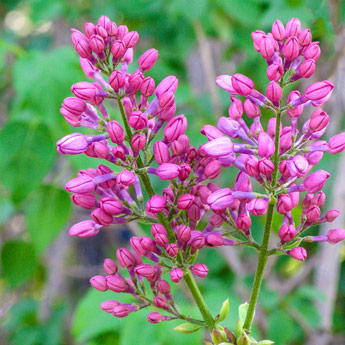Fruit Flies in the Worm Bin
-
Helpful Products from Gardens Alive!
-
 Pot Stickers - Insect Glue Trap
Pot Stickers - Insect Glue Trap -
 Bull's-Eye™ Ant Bait Station
Bull's-Eye™ Ant Bait Station
Q. I've been using worm bins for several years and currently have a fruit fly issue. I have a glass of red wine sitting next to the stack and use a vacuum cleaner to capture as many as possible. I just listened to several of your old shows and loved hearing about Bt. I use mosquito dunks in my rain barrels outside; can I also use them to kill fruit flies in the worm composters inside?
---Donna in upstate (Hobart) New York
P. S.: I'm a long time listener and love to disseminate your info while I work (I'm a dental hygienist; captive audience!)
A. And they can't talk back; I love it!
OK—now she wrote "Bt" but clearly means BTI; so let's discuss the difference.
Bt stands for Bacillus thuringiensis, which nobody wants to try and remember, spell or pronounce so we use the shorthand Bt. Thousands of different strains of this soil dwelling organism have been identified and studied over the years, but researchers have only found uses for a handful, which are individually identified by the use of a third letter in their abbreviated name. (BTI, BTK, BTG…)
The original strain, officially known as BTK but often just called "Bt", has been used since the 1920s to control pest caterpillars. You spray it on crops you want to protect and any caterpillars that eat the sprayed plants immediately stop feeding and soon die. But only caterpillars; it has no effect on any other living creature.
Then there's BTI. The "I" stands for 'israelensis'. This strain, discovered by a researcher in Israel, has been used since the 1990s, mostly for mosquito prevention. This strain of Bt has no effect on caterpillars, but prevents members of the fly family that breed in wet environments from reaching adulthood.
The most popular use of BTI is in standing water for mosquito prevention. Female mosquitoes will lay their eggs in the water, but the larvae will die before they can become biting adults. It doesn't hurt anything else in the water, like fish or frogs. And yes, mosquitoes are technically in the fly family, a fact I discovered when I was researching the use of BTI against fungus gnats; those annoying little creatures that breed in the soil of overwatered house plants…
…and learned that BTI targets many members of the "Diptera" family—what science calls the 'true flies'. It's a HUGE family, with over a million different members, including mosquitoes, biting midges and gnats.
Plus house flies and even horse flies. But thankfully not dragonflies, because these extremely beneficial mosquito eaters also breed in water. But they're in a completely different insect family that BTI doesn't affect. (They aren't 'true' flies; it's just a common name in their case.) So you can treat standing water to prevent successful mosquito breeding without harming any dragonflies that may also be breeding in that water.
OK—now back to worm bins and fruit flies! Number one: Don't blame the worms! To misquote Shakespeare, "the fault, Dear Brutus, lies not in our worms, but in our fruit". There is a constant chance of these creatures entering the house on any fruit we bring inside from the store or garden. And they often just fly in with us when we open a door; they're everywhere in the outside environment.
I've personally had to fight them twice: Fruit Fly I—the war (I thought) to end all wars; and then Fruit Fly II—the Empire Strikes Back. Persistence with fruit fly traps—little dishes of vinegar or red wine set out in the kitchen and near my worm bin—ended the first conflict. The problem returned a few years later, but that time, it started in the Spring—so I just decided to do a worm bin Spring cleaning.
I dumped everything from my worm bins—finished castings and fresh layers of kitchen waste and shredded newspaper—into my outdoor bins (the sealed ones with locking lids to keep out vermin—and in this case, to also maintain the moist environment the worms require). That material finished composting fast, and my shredded leaves really seemed to benefit from the extra worm help.
But I didn't want to have to find a fresh supply of worms later on; so as I dumped, I also plucked, and saved a couple dozen worms that I hoped would survive for awhile in a plastic container of moist finished compost with air holes punched in the lid.
Then I washed the stackable trays that make up my worm bin 'tower' over top of my raised beds, so that all of the washed-off worm castings and brown liquid from the washing would feed my plants. Then we just followed fruit fly rule #1 and made sure not to leave any fruit or scraps out in our kitchen for awhile. With no fruit out in the open to support them (we moved our compost crock outside), we were quickly fly free.
After a couple of weeks without a sighting, I decided to start the bin up again—and was delighted to see that my worms in storage were happy and alive.
And this is when I started using BTI. Fruit flies are a lot like fungus gnats and so I figured it had the potential to stop their breeding in a moist environment as well. Now I add a few fresh sprinkles of BTI granules to the bin every couple of weeks. (Our listener could bust up her donut shaped dunks into smaller pieces, but I find the granules to be just the right size.)
And it has worked perfectly. Whenever I prepare a new tray for my Worm Tower, I put in a layer of fruit scraps and coffee grounds and cover it with some shredded newspaper, as always. Then I sprinkle some BTI granules on top and add the water you need to make everything nice and damp in there for the wormies.
There's a spigot at the bottom of the tower that makes it easy to drain off the 'worm tea' that accumulates inside. You can either use this tea as a liquid fertilizer or pour it back into the top tray to keep the insides of the bin moist. I used to use it both ways, but now I always pour that liquid back onto the top tray, because I figure I'm also recirculating any BTI that's still active every time.
I repeat: No more flies. Which is great, because now I know I can recycle my kitchen scraps indoors in the winter again. No more fighting through deep snow to get to my outdoor bins because of fear of fruit flies!
-
Helpful Products from Gardens Alive!
-
 Pot Stickers - Insect Glue Trap
Pot Stickers - Insect Glue Trap -
 Bull's-Eye™ Ant Bait Station
Bull's-Eye™ Ant Bait Station







 Gardens Alive! & Supplies
Gardens Alive! & Supplies




